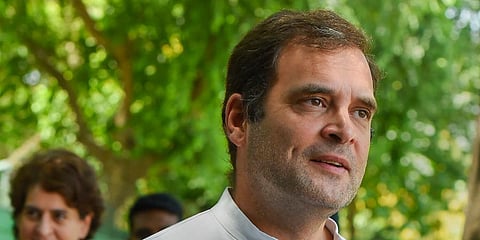

A senior Congressman once famously said that death is not necessarily a pre-condition for rigor mortis to set in. The wily and witty characterisation of a Congress regime aptly captures the current state of the Opposition as five states head for polls and India into a summer of hectic politics.
It has been over 351 weeks since the Modi Sarkar came into being. In these 80 months, the BJP has ruthlessly trolled opponents and rolled on to expand its footprint across the political landscape it has occupied attention, enlarged affiliation, is in power in 15 states and is challenging the suzerainty of regional rulers in West Bengal, Odisha and Telangana.
The Opposition, in stark contrast, is in retreat floundering against the Modi-Shah juggernaut and struggling to preserve relevance. In their preoccupation with ricocheting rhetoric, the Opposition seems caught in a cul-de-sac perpetually waiting for Modi to blunder. The Opposition has vacated the arena of competing ideas. Unsurprisingly, it has an identity crisis.
Political affiliation does draw on what a party opposes, but fundamentally rests on what the party stands for. Opposition parties are unhinged from people and public purpose. To enable mass mobilisation, parties must evolve to re-invent themselves — on where they stand with the government for public good, and what is that competing idea which separates them from the BJP.
Individual charisma matters. But it is ideas which define the individual and craft the charisma. The Republican Party’s success under Ronald Reagan was based on a plank of an alternate vision of America wrapped in Reaganesque charisma. Tony Blair recrafted the Labour Party to expand its vision of what it stood for in British politics even at the risk of being dubbed ‘Tory’ Blair and ensured victory.
In the run up to the 2014 election, Narendra Modi arrived with the Gujarat Model and an alternate vision for India. The campaign was designed in such a way that people chose to see in him what they looked for. Modi’s approach to public policy is entrepreneurial and rests on what delivers political dividends whether it was the pro-poor programming of policy in the first term, or the opening up of agri-sector and the promise of privatisation in 2021.The ideological plank crafted by Modi stretches from Garibi Hatao to Thatcherism and is scaffolded by aggressive nationalism and Hindutva.
It is not that the BJP has always got it right. It had a series of implosions from 2004 to 2012. It had a wishy-washy view on public policy on FDI, retail and it even partnered with the Left in opposing the nuclear deal and the infamous trust vote. But, it reinvented itself around ‘Moditva’.
As with nuclear physics, social science demands the need for the coming together of a catalyst, conditions and critical mass for a chain reaction in politics this translates as a catalysing idea to woo a critical mass and the organisational muscle to mobilise affiliation.
The Congress lacks leadership and its organisation is in tatters. The regional satraps harbour foggy notions and national ambitions. Neither has shown the capacity to present an alternate vision.
Take the agitation against farm laws. Almost every party has critiqued the constraints hurting farming and has proposed/supported reforms at some time or the other. Yet not one party or a coalition has presented a solution or an alternate Bill which preserves the rights of farmers without hurting potential. Similarly, whether it is on Article 370 or CAA or NRC, the parties have expressed dissent but waffled on alternatives.
The Congress Party inhabits a universe of its own. Its members are obsessing about who they will follow and not what they represent. It is yet to figure out whether its leader is coming or going — it is seven years since the 2013 coronation in contextually appropriate Jaipur. It seems the post coronation observation ‘power is poison’ weighs heavily on the party.
Its articulation of dissent on socio-political issues is self-defeating. Its leader promises to defend Tamil interests in Chennai, forgetting the IPKF chapter of the eighties and the 1963 notification imposing Hindi which ousted it from the state. It has charged that the BJP is anti-minority in its formulation of programmes and policies. Ideally, the charge of selective exclusion is better represented by invoking the guarantee of equality enshrined in the Constitution. That though has not occurred to the party steeped in tokenism of the 42nd Amendment. Its idiom of disagreement reeks of yester-year thinking.
Its choices on economic policies reflect the confusion and disconnect with popular aspirations. It has opposed the very reforms in farm laws which it proposed in its manifesto. The party has reason to worry that its stand on disinvestment in 2021 is exactly that of the Left Front in the nineties ---and that is unsurprising since the party which initiated liberalisation in 1991 also instituted a committee in 1998 as a section believed reforms were anti-poor.
Finally the age of politics as the CSR wing of family businesses is over. Success in politics demands more than cameo election appearances. The BJP under Modi is a relentless 24x7 machine focussed on domination and expansion of an idea. Challenging it calls for total commitment and competing ideas
Shankkar Aiyar
Author of The Gated Republic, Aadhaar: A Biometric History of India’s 12 Digit Revolution, and Accidental India shankkar.aiyar@gmail.com